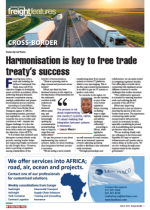Re gional integration continues to gain prominence across southern Africa as the African Continental Free Trade Area (AfCFTA) promotes cross-border trade and actively sets out to make it easier by reducing tariffs and trade barriers.According to Michael Henning, sales manager at Easy Clear, the AfCFTA is fast gaining momentum. “Service providers are providing a platform enabling shipments under the AfCFTA, thus supporting and promoting regional trade and integration,” he said. “For years, Easy Clear has integrated with our neighbouring BLNE partners – Botswana, Lesotho, Namibia and Eswatini – who use Asyworld (a computerised customs management system). “We are excited about the expansion of regional integration, especially with South Africa having recently announced its inaugural shipment under AfCFTA, heralding future growth and trade through South African ports.”According to Henning, another growing trend is digitalisation, which is expected to remain in focus for the foreseeable future. This, as the new trade paradigm known as Global Trade 2.0 ushers in a new landscape for international trade, in keeping with the acceleration of the digital revolution. “The increase in data made available by digitalisation is impacting how Sars (the SA Revenue Service) manages borders, driven as it is by the need to increase the efficiencies at our land borders and ports. The availability of technology and access to data that enables advanced risk management is revolutionising border management,” he told Freight News. “However, trusted trader frameworks like AEO and SACU AEO need to be better utilised and implemented to improve border security, while reducing costs and increasing predictability in cross-border trade.” Henning said regulatory harmonisation and initiatives to align customs procedures, trade documentation and product standards were gaining momentum as these initiatives were reducing trade barriers. “A recent export roadshow highlighted the complexity of product standards and conformity on the continent which traders must deal with,” he said. “It is an obvious barrier to trade that must be addressed. This is possible through a systems-based approach to trade, which we are currently exploring.”He said that with the supply chain never standing still, logisticians were continually operating, making it imperative for service providers such as Easy Clear to focus constantly on innovation. “Improving our software is ongoing as we aim to increase the productivity and performance of our clients. Recent enhancements include a more streamlined DA306 process for capturing and submitting low-value consignments in the airfreight cross-border courier sector and a continued drive to digitise processes and integrate for the purposes of trade facilitation.”Thanks to the AfCFTA, Henning said, trade and investment presented a significant opportunity for cross-border logistics. “The recent addition of five new member states to BRICS has opened investment and increased trade opportunities internationally with partner countries. E-commerce has seen rapid growth, and the adoption of technology is driving a new ecosystem of trust and of globally connected partners changing the way we do business these days,” he said. “What was known as e-commerce is now becoming the norm as we adapt to a digitalised landscape with new standards and a connected supply chain. “These opportunities underscore the need for collaboration between all partners in the supply chain to unlock the growth and development opportunities on the continent for the benefit of all parties.”Henning said the outlook for cross-border trade remained highly positive, buoyed by the increased cooperation between parties in the supply chain and the rapid adoption of technology.

